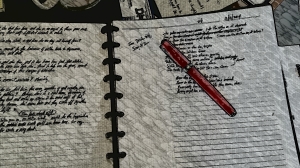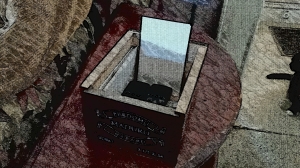
The creative process is, necessarily and naturally, messy. And I don’t know about you, but sticking around waiting for “The Muse” to strike is a recipe for having a lot of creative mess that goes absolutely nowhere.
I like having a writing routine, one that helps me write no matter the internal or external weather. For that reason I use a songwriting pipeline to ensure I always have a work in progress, no matter what.
Some things are simply non-negotiable.
The Songwriting Pipeline
Take a look around my house and you’ll see just how messy creative process can be. When my wife Susan and I are both immersed in projects, you can see the messiness of it everywhere. When things are in disarray, I know that powerful creating is going on.
Used to be I’d have scraps of paper all over the house — in the basket where we kept the car keys, on my dresser, on the coffee table, on the end tables, on my nightstand, on my desk… everywhere! And while ever grateful for the flow of ideas and nifty one-liners, I seemed never to get much done. Not only was I not organized in a way that made it possible to be productive, I had no writing process to ensure that I knuckled down to do the real work of craftsmanship that transforms a vague idea into a complete piece of music.
I hit on the idea of a songwriting pipeline that accomplished three important things:
- It forced me to routinely gather the ideas and snippets into a single location from which I could pick and choose something to work on.
- It ensured I always had a work in progress.
- It created the conditions necessary to not only create, but complete good songs.
For me, the whole process begins with having a way to collect the many ideas that come to me, as they arise. That’s why I made it easy to capture notes and ideas.
Capture Notes and Ideas in One Location
Oh, the anguish and despair that arises when one forgets an idea that there was no time or way to write down! I minimize such events by (almost) always having paper and a sound recorder with me. To that end, there are stacks of index cards and pens in every room of our house. We even invite visitors to jot down ideas, phrases, sentences on the cards, too.
I collect the ideas regularly, if not immediately, and drop them into a nice little cigar box so they don’t get lost.

(At some point we’re going to host a songwriting party where we take snippets written by ourselves and others, pass them out at random, and give everyone 10 minutes to write a song from them. Then we’ll gather in the living room and go around the circle, each songwriter delivering — with much gusto — the resulting miracle. Or disaster. It won’t matter. Really.)
Maybe it sounds a little complicated, but I have lost too many snippets and ideas to the occasional cleaning frenzy to ever risk losing them again. And there’s nothing worse for me than having a flash of an idea and jotting it down, only to discover it has been whisked away forever.
Okay, sure — some of the ideas are ludicrous. You have to sort through them at some point and decide what to do.
That’s where the “Slush Pile” comes in.
The Songwriting Slush Pile
I regularly go through the idea snippets from both the index cards and my daily journal entries. The ones that strike me as having some potential, however inane they may seem, I place into a notebook I think of as my slush pile.
In the traditional publishing world, the slush pile is a set of unsolicited manuscripts sent directly to a publisher or editor for consideration. My slush pile is the set of ideas that are worthy of further development.
My slush pile notebook now contains something on the order of 100 sketches and ideas. New ideas go into the notebook UNLESS one grabs me by that mystical sense of creative urgency that requires me to sit NOW and work on the idea that has struck my fancy.
Most often, though, the ideas sit in my slush pile until I am in need of a new working song in my songwriting pipeline. I then pull the sketch out of the slush pile and insert it into my Works In Progress notebook.
The Works In Progress Notebook
Once a song idea is in the Works In Progress notebook, I work it until it’s as complete as I can make it.
Sometimes I’ll have an idea for a melody, too, which I hum, sing, play or otherwise babble into one of the Sony ICD-PX312 recorders I use for that purpose. I mark the track number from the Sony on the latest draft of the words.
And then this sort of bouncing back and forth takes place. I work the melody and music structure in tandem with the words, making edits to both until I have a playable version of the song.
Then the real work begins.
The Work at the End of the Pipeline
Once a song idea has made it this far in my pipeline, it’s ready for final development. I often find myself at this point having to be ruthless with what I’m writing.
“In writing, you must kill your darlings,” William Faulkner once said, and it’s a directive I’ve always followed. Anything that doesn’t serve the story of the song gets cut. Each and every line, every single word, must serve what I want to say, and do so in the voice of the person telling the story of the song.
Eventually (well, most of the time, anyway) I reach a moment in which I’m ready to play the song for someone else. That’s where my wife Susan comes in. Often I’m bringing ideas that are good but are missing elements of continuity, and she’s masterful at continuity. I can always count on her to spot what’s not working. We’ll often end up reworking a song until we’ve created a version that hangs together.
And then I record it for two other trusted friends, both of whom are quite ready to tell me unflinchingly what they think and make suggestions about clarifying words, or adding (or removing!) a bridge.
Once a song has made it through the trusted friends stage, it’s ready for release. And I move on to the next idea in the slush pile.
Creative Process is Messy
The creative process is messy no matter how well you organize it, and that’s why having structures in place to hold the pieces together at the outset is so important. Creativity blossoms in structure; structure is the scaffolding you use to erect the frame that will ultimately support the walls of the house that is the song you’ve written.
Ultimately, for me, it’s the process and structure that helps me write something every day. I believe the process itself is in fact what saves me from debilitating depression and anxiety — states I once attempted to ameliorate or escape in, ah, less productive ways. It doesn’t seem to matter much whether the songs themselves are “good.” It’s the act of working an idea and completing it that keeps me grounded and gives me a sense that I’m honoring my deepest self.
Sometimes it even results in music other people enjoy, too. And that is a pleasure worth the work.
